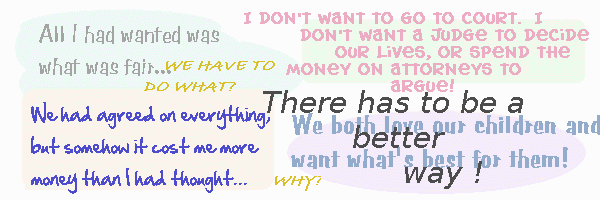|
  © 2005 Arlene C. Richman, Esq.
© 2005 Arlene C. Richman, Esq.
http://www.collaborativelawflorida.com/
Collaborative Law: A New Method of Dealing
with Divorce, Custody,
Child Support and Visitation Issues
by Arlene C. Richman, Esq.

 A family law attorney is constantly confronted with clients who, while no longer wanting to be married to their
spouse, want to end the relationship in a way that is fair to both of them.
And, with a minimum of fees and costs to do so. The problem is a system
that encourages litigation and attorneys who treat the parties as adversaries. A family law attorney is constantly confronted with clients who, while no longer wanting to be married to their
spouse, want to end the relationship in a way that is fair to both of them.
And, with a minimum of fees and costs to do so. The problem is a system
that encourages litigation and attorneys who treat the parties as adversaries.
 In the 1990's a new concept to deal
with family problems was started in Wisconsin by attorney Stuart Webb.
The process is called "Collaborative Law." It quickly spread
to California and the Western States. Collaborative Law has finally come
to Florida. In the 1990's a new concept to deal
with family problems was started in Wisconsin by attorney Stuart Webb.
The process is called "Collaborative Law." It quickly spread
to California and the Western States. Collaborative Law has finally come
to Florida.
 The concept is simple, but the execution
requires attorneys and individuals who understand the principles and procedures
and are willing to work within those confinements. The concept is simple, but the execution
requires attorneys and individuals who understand the principles and procedures
and are willing to work within those confinements.
 The simple concept: The parties
sign a Participation a Agreement. This Agreement requires that they agree
to work with each other and each attorney will work with the other attorney
to resolve the issues. All parties will voluntarily produce all documents
necessary to resolve the action. There will be no hearings, no depositions,
and no motions to the court. If experts are needed, such as accountants,
psychologists, or appraisers, the parties will agree on one, in order to
avoid a "battle of the experts." The simple concept: The parties
sign a Participation a Agreement. This Agreement requires that they agree
to work with each other and each attorney will work with the other attorney
to resolve the issues. All parties will voluntarily produce all documents
necessary to resolve the action. There will be no hearings, no depositions,
and no motions to the court. If experts are needed, such as accountants,
psychologists, or appraisers, the parties will agree on one, in order to
avoid a "battle of the experts."

 BUT!! How do you insure against
the threat of court by the client or the attorney? BUT!! How do you insure against
the threat of court by the client or the attorney?
 This is a key to the collaborative
law process: If the process breaks down, then the client has to obtain
a new attorney. The downside for the client: the additional expense of
hiring new counsel, having the new counsel get aquatinted with the case,
and the emotional drain on everyone. The downside for the attorney: he
or she loses the client. This is a key to the collaborative
law process: If the process breaks down, then the client has to obtain
a new attorney. The downside for the client: the additional expense of
hiring new counsel, having the new counsel get aquatinted with the case,
and the emotional drain on everyone. The downside for the attorney: he
or she loses the client.
 Needless to state, the advantages
are as follows; No costs for depositions; no costs for hearings; no costs
for routine discovery; a commitment to cooperation by all parties with
attorney's who represent you and use the principles of Collaborative Law. Needless to state, the advantages
are as follows; No costs for depositions; no costs for hearings; no costs
for routine discovery; a commitment to cooperation by all parties with
attorney's who represent you and use the principles of Collaborative Law.
 Another benefit, studies have shown
that agreements reached by the parties, rather than court imposed, have
a greater chance of success. Another benefit, studies have shown
that agreements reached by the parties, rather than court imposed, have
a greater chance of success.
 The Florida Supreme Court has approved
the concept of Collaborative Law and the family law section of the Florida
Bar has approved the concept of collaborative law. The Florida Supreme Court has approved
the concept of Collaborative Law and the family law section of the Florida
Bar has approved the concept of collaborative law.
 The Collaborative Law process is
applicable to any aspect of family law, including, divorce, child support,
custody, visitation, and modifications. The Collaborative Law process is
applicable to any aspect of family law, including, divorce, child support,
custody, visitation, and modifications.
 Since the parties have usually resolved many issues before encountering a roadblock, all participants have a vested
incentive to discuss ideas to resolve the problem and move forward with a settlement, a settlement that both parties and their attorneys have worked together to reach. Since the parties have usually resolved many issues before encountering a roadblock, all participants have a vested
incentive to discuss ideas to resolve the problem and move forward with a settlement, a settlement that both parties and their attorneys have worked together to reach.


Arlene Richman is an attorney practicing collaborative law and
family law in South Florida (including
Broward
County, Miami,
Fort
Lauderdale,
(Hollywood) since 1987. Collaborative Lawyers Florida is a state-wide educational and professional development
association and business directory of independent Florida licensed attorneys at law and family law firms who practice in
the areas of collaborative divorce and collaborative family law.
Collaborative Lawyers Southeast Florida attorneys
serve South Florida, including Dade County, Broward County, and
Palm Beach
County, and the cities of Miami,
Pembroke Pines, Hallandale, Hollywood, Fort Lauderdale, Pompano
Beach, Palm Beach, West Palm Beach,
Boynton Beach, Deerfield Beach, Delray Beach, Lauderhill, Lauderdale Lakes,
Coral Springs, Weston, Parkland, Tamarac, Plantation, Sunrise, Miami Lakes, Miami Shores.

Information on this website should not be taken as legal advice. Laws change, situations differ, and there may be exceptions to general rules. Except as otherwise may be provided, this website and contents are © 2009 Collaborative Lawyers, Inc. Collaborative Lawyers, Inc., is a state-wide educational and professional development association and business directory of independent Florida licensed attorneys at law and law firms who practice in the areas of collaborative divorce and collaborative family law. It is not a law firm or attorney referral organization. Website maintenance by argate.net
Collaborative Lawyers Southeast Florida attorneys serve South Florida,
including Dade County, Broward County, and Palm Beach County, and the cities of
Miami, Pembroke Pines, Hallandale, Hollywood, Fort Lauderdale,
Pompano Beach, Palm Beach, West Palm Beach, Boynton Beach, Deerfield
Beach, Delray Beach, Lauderhill, Lauderdale Lakes, Coral Springs, Weston, Parkland,
Tamarac, Plantation, Sunrise, Miami Lakes, Miami Shores.
| |










